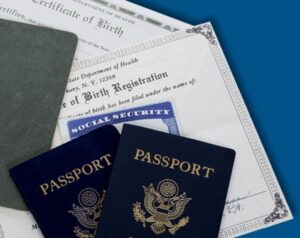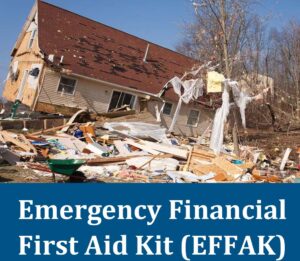
When disaster strikes, your immediate concern will be your safety and the safety of those you care about. Once the immediate danger passes, however, having your financial and medical records and important contact information will be crucial to help you start the recovery process quickly. Taking time now to safeguard these critical documents will give you peace of mind, ensure you have access to essential medical and prescription information, and help you avoid additional stress during the difficult days following a disaster.
In addition, take the time now to think about the priceless personal items you would want to protect from damage or take with you if you had to evacuate your home suddenly.
The first step is to take an inventory of your household documents, contacts, and valuables. The checklist below will get you started.

Then download the Emergency Financial First Aid Kit (EFFAK) at www.ready.gov/financialpreparedness for more complete checklists and guidance on collecting and safeguarding this vital information.
Put a checkmark next to any item you may need to collect and safeguard. Be sure to include emergency contact phone numbers or other contact information with your documentation for questions that may arise following a disaster.

Think about the documents you would need to identify yourself and your household members, including children and pets, your relationships, or status. These may include:
- Vital records (birth, marriage, divorce certificate, adoption, child custody papers)
- Passport, driver’s license, Social Security card, green card, military service identification, other
- Pet ownership papers, identification tags

If your home or income is impacted by a disaster, you will need documentation to request assistance from insurance providers and from government disaster assistance programs.
- Housing: lease or rental agreement, mortgage, home equity line of credit, deed
- Vehicle: loan documents, VIN, registration, title
- Other Financial Obligations: utility bills, credit cards, student loans, alimony, child support, elder care, automatic payments such as gym memberships
- Financial Accounts: checking, savings, debit cards, retirement, investment Insurance Policies: homeowners, renters, auto, life, flood, appraisals, photos, and lists of valuable items
- Sources of Income: pay stubs, government benefits, alimony, child support
- Tax Statements: Federal/state income tax returns, property tax, vehicle tax
- Estate Planning: will, trust, power of attorney

- Health/dental insurance, Medicare, Medicaid, VA health benefits
- List of medications, immunizations, allergies, prescriptions, medical equipment and devices, pharmacy information
- Living will, medical power of attorney
- Caregiver agency contract or service agreement
- Disabilities documentation
- Contact information for doctors/specialists, dentists, pediatricians, veterinarians

- Employers/supervisors
- Schools
- Houses of worship
- Social service providers
- Homeowners Associations
- Home Repair Services: utilities, plumber, roofer, carpenter, electrician

- Priceless personal mementos, family photos, and keepsakes
- Possessions with monetary value, including jewelry, art, and collectibles

Once you have gathered your financial, legal, and contact information, it is essential to safeguard this information.
- Consider storing paper copies of important documents at home in a fireproof and waterproof box or safe, in a bank safe deposit box, or with a trusted friend or relative. If you are using a safe deposit box, you may want to ask your bank or check state laws to confirm who can and cannot access the safe deposit box if the lessee dies or is incapacitated.
- Store electronic copies of important documents in a password-protected format on a removable flash or external hard drive in your fireproof and waterproof box or safe, or consider using a secure cloud-based service.
- Think about where you store valuable belongings and ways to better protect these items. If you have valuable items stored in a basement, you may want to move them to a higher location and put them in waterproof containers to avoid water damage. Or you may want to keep small items in a flood/fireproof home safe. You may also want to secure items that are displayed on shelves or walls if your home may be subject to high winds or earthquakes.
Many thanks to FEMA for this information!
https://www.ready.gov/sites/default/files/2020-03/fema_safeguard-critical-documents-and-valuables_0.pdf
Would you like a print copy of this infographic mailed to you?
Simply fill out the form below

